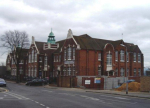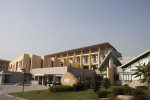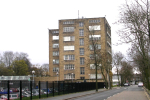UK News
-
 SFO launches international bribery probe into data centre contract
The Serious Fraud Office (SFO) has launched a multi-million pound international bribery investigation, conducting raids on five properties and arresting three individuals.Read More...
SFO launches international bribery probe into data centre contract
The Serious Fraud Office (SFO) has launched a multi-million pound international bribery investigation, conducting raids on five properties and arresting three individuals.Read More... -
 Nigel Farage and Reform UK face crucial test in local elections
Reform UK leader Nigel Farage is facing a major test in the UK’s local elections this Wednesday, as his party attempts to capitalize on growing support and position itself as a seriousRead More...
Nigel Farage and Reform UK face crucial test in local elections
Reform UK leader Nigel Farage is facing a major test in the UK’s local elections this Wednesday, as his party attempts to capitalize on growing support and position itself as a seriousRead More... -
 Chancellor Rachel Reeves under investigation over gifted theatre tickets
Chancellor Rachel Reeves is under investigation by Parliament's standards commissioner concerning her entries in the Commons register of interests.Read More...
Chancellor Rachel Reeves under investigation over gifted theatre tickets
Chancellor Rachel Reeves is under investigation by Parliament's standards commissioner concerning her entries in the Commons register of interests.Read More... -
 Families to gain more choice in home heating upgrades
Families across the UK could soon have greater flexibility when upgrading their home heating systems, thanks to new government proposals aimed at boosting green energy and loweringRead More...
Families to gain more choice in home heating upgrades
Families across the UK could soon have greater flexibility when upgrading their home heating systems, thanks to new government proposals aimed at boosting green energy and loweringRead More... -
 UK to introduce crypto regulation in line with U.S. approach
The UK government announced plans to bring cryptocurrencies under formal financial regulation, aligning more closely with the United States rather than the European Union. Finance MinisterRead More...
UK to introduce crypto regulation in line with U.S. approach
The UK government announced plans to bring cryptocurrencies under formal financial regulation, aligning more closely with the United States rather than the European Union. Finance MinisterRead More...

Culture
-
 Harrogate’s cherry blossoms rival Japan’s sakura season
While Japan’s iconic cherry blossom season draws millions each year, a town in North Yorkshire is proving you don’t need to fly 6,000 miles to experience the magic.Read More...
Harrogate’s cherry blossoms rival Japan’s sakura season
While Japan’s iconic cherry blossom season draws millions each year, a town in North Yorkshire is proving you don’t need to fly 6,000 miles to experience the magic.Read More... -
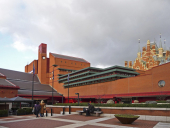 British Library set for £1.1 billion expansion
The British Library, the largest in the UK, is set for a major transformation with a £1.1 billion expansion project now approved.Read More...
British Library set for £1.1 billion expansion
The British Library, the largest in the UK, is set for a major transformation with a £1.1 billion expansion project now approved.Read More... -
 Export bars placed on two 18th century Agostino Brunias paintings
Two paintings by the 18th-century Italian artist Agostino Brunias, both depicting scenes from the Caribbean island of St Vincent, have been placed under temporary export bars to give UKRead More...
Export bars placed on two 18th century Agostino Brunias paintings
Two paintings by the 18th-century Italian artist Agostino Brunias, both depicting scenes from the Caribbean island of St Vincent, have been placed under temporary export bars to give UKRead More... -
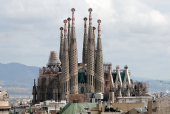 Pope recognizes Antoni Gaudí's "heroic virtues," puts him on path to sainthood
The Vatican has taken a significant step toward making renowned Spanish architect Antoni Gaudí a saint, officially recognizing his "heroic virtues." Often referred to as "God's architect,"Read More...
Pope recognizes Antoni Gaudí's "heroic virtues," puts him on path to sainthood
The Vatican has taken a significant step toward making renowned Spanish architect Antoni Gaudí a saint, officially recognizing his "heroic virtues." Often referred to as "God's architect,"Read More... -
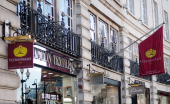 Britain’s oldest Indian restaurant faces closure amid Central London lease dispute
Veeraswamy, the UK's oldest Indian restaurant, is facing the threat of closure just before reaching its centenary, due to a lease disagreement with the Crown Estate.Read More...
Britain’s oldest Indian restaurant faces closure amid Central London lease dispute
Veeraswamy, the UK's oldest Indian restaurant, is facing the threat of closure just before reaching its centenary, due to a lease disagreement with the Crown Estate.Read More... -
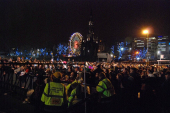 Communities invited to nominate beloved UK traditions for National Heritage List
This summer, communities across the UK will be able to nominate their favourite traditions—from iconic celebrations like Notting Hill Carnival and Hogmanay to time-honoured crafts likeRead More...
Communities invited to nominate beloved UK traditions for National Heritage List
This summer, communities across the UK will be able to nominate their favourite traditions—from iconic celebrations like Notting Hill Carnival and Hogmanay to time-honoured crafts likeRead More... -
 £20m museum renewal fund opens for England’s civic museums
Civic museums across England can now apply for a share of the new £20 million Museum Renewal Fund, aimed at boosting access to collections, enhancing educational programmes, andRead More...
£20m museum renewal fund opens for England’s civic museums
Civic museums across England can now apply for a share of the new £20 million Museum Renewal Fund, aimed at boosting access to collections, enhancing educational programmes, andRead More... -
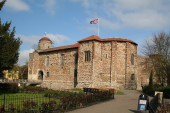 The underrated UK city that was England’s first capital — 1,000 years before London
Tucked away in Essex lies a city that predates London as England's capital by over a millennium. Rich in Roman and medieval history, Colchester only officially became a city in 2022 as part ofRead More...
The underrated UK city that was England’s first capital — 1,000 years before London
Tucked away in Essex lies a city that predates London as England's capital by over a millennium. Rich in Roman and medieval history, Colchester only officially became a city in 2022 as part ofRead More... -
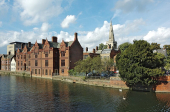 Universal Studios to open first UK theme park in Bedford by 2031, creating 28,000 jobs
The UK is officially getting its first Universal Studios theme park, with a grand opening set for 2031. The landmark project, backed by the UK government, is expected to bring in a staggeringRead More...
Universal Studios to open first UK theme park in Bedford by 2031, creating 28,000 jobs
The UK is officially getting its first Universal Studios theme park, with a grand opening set for 2031. The landmark project, backed by the UK government, is expected to bring in a staggeringRead More... -
 MI5 lifts the veil on 115 years of secrets in new exhibition
For the first time in its 115-year history, MI5 is pulling back the curtain on its shadowy past. A new exhibition at the National Archives in London, MI5: Official Secrets, offers the public anRead More...
MI5 lifts the veil on 115 years of secrets in new exhibition
For the first time in its 115-year history, MI5 is pulling back the curtain on its shadowy past. A new exhibition at the National Archives in London, MI5: Official Secrets, offers the public anRead More... -
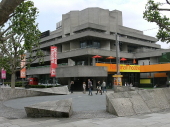 Tourist tax could help revive London’s arts and culture scene
A growing number of voices are calling on the government to allow London to introduce a tourist tax, similar to those already in place in many popular European cities. The Centre for LondonRead More...
Tourist tax could help revive London’s arts and culture scene
A growing number of voices are calling on the government to allow London to introduce a tourist tax, similar to those already in place in many popular European cities. The Centre for LondonRead More... -
 £1bn Chinese ceramics gift to British Museum approved
The Charity Commission has officially approved the largest donation in the British Museum’s history—a collection of Chinese ceramics valued at around £1 billion.Read More...
£1bn Chinese ceramics gift to British Museum approved
The Charity Commission has officially approved the largest donation in the British Museum’s history—a collection of Chinese ceramics valued at around £1 billion.Read More... -
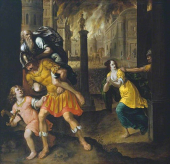 UK to return Nazi-looted painting to Jewish family
A 17th-century painting stolen by the Nazis in 1940 from a Jewish art collector in Belgium is set to be returned to the collector’s descendants, the British government announced on Saturday,Read More...
UK to return Nazi-looted painting to Jewish family
A 17th-century painting stolen by the Nazis in 1940 from a Jewish art collector in Belgium is set to be returned to the collector’s descendants, the British government announced on Saturday,Read More...

British Queen celebrates
Most Read
- Teen held after US woman killed in London stabbings
- Heave-ho Harry! Prince prepares to join the walking wounded in ice trek to North Pole
- Football: Farhad Moshiri adamant Everton deal above board
- "Master of English Style". Interview with Designer Lydia Dart
- Letter to the Financial Times from Lord Mayor Alderman Michael Bear
World News
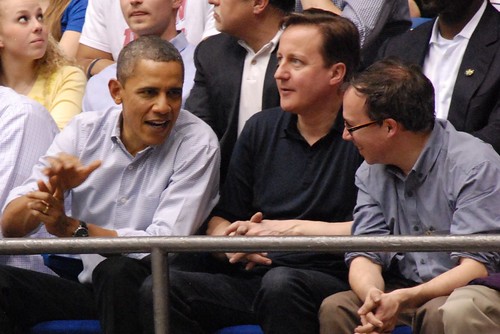
A "chuffed to bits" President Barack Obama gushed over British Prime Minister David Cameron on Wednesday, but deepening world crises conspired to darken a warm welcome for a special ally.
Obama went out of his way to hail America's "indispensable" relationship with Britain, even offering to learn the rules of cricket, gifting his guest a top of the range American grill, and laying on a sumptuous state dinner.
But both men were forced to dwell on the terrible human costs of war, with sharp questions looming about the justification for more combat in Afghanistan and the possibility of new Middle East combat over Iran's nuclear program.
Obama and Cameron
conspicuously used a joint press conference to try and convince weary American and British voters that recent sacrifices in Afghanistan had wrought "real progress" towards a future secure state.
The US leader went on the record for the first time to back NATO's planned transfer to a support role in 2013 before a full withdrawal the next year, though said there would be no sudden unscheduled drawdowns in coming months.
He also used the press conference in an unseasonably warm White House Rose Garden, with cherry blossoms in full bloom, to deliver a clear, and stiffened warning to Iran -- take new nuclear talks seriously, as time is running out.
But the elaborately choreographed event, from a 19-gun salute to Cameron to the state dinner, was about celebrating an alliance forged in war that endures.
"Through the grand sweep of history, through all its twists and turns, there is one constant: the rock-solid alliance between the United States and the United Kingdom," said Obama.
Both men quipped about the time in 1814 when the British sent a colonial army to burn down the White House.
"They made quite an impression -- they really lit up the place," Obama said.
Cameron gazed across ranks of troops in ceremonial dress on the White House lawn and joked: "You're clearly not taking any risks with the Brits this time."
Obama also lapsed into some cliche British vernacular, telling Cameron he was "chuffed to bits" to welcome him for a "good natter" and wanted to keep the US-British relationship in a "top notch" state.
After their trip to a college basketball game in Ohio on Monday, Cameron said he would get his own back by taking Obama to a cricket match, prompting a wide presidential grin.
The visit gave Obama a brief respite from the grind of a crisis-scarred presidency and allowed him to underline his credentials as a statesman as he cranks up the pace of his reelection effort.
Cameron may have enjoyed the trip even more as his coalition government is slogging through a grim period of fiscal austerity and with stagnant growth threatening to plunge Britain back into recession.

A US soldier has come out of his base in southern Afghanistan and started shooting Afghan civilians, the provincial governor said.
People were both killed and wounded in the shooting spree in Panjwai district of Kandahar province, Governor Tooryalai Wesa told reporters, though he did not provide numbers.
Nato forces spokesman Justin Brockhoff said a US service member had been detained as the alleged shooter but did not provide details on the incident.
He said the coalition had reports of "multiple wounded" but none killed. The wounded are receiving treatment at Nato medical facilities, he said.
The service member is being held at a Nato base and US forces are investigating the shooting in co-operation with Afghan authorities, Mr Brockhoff said. He said it was not clear if the alleged shooter knew the victims.
The shooting comes after weeks of tense relations between US forces and their Afghan hosts following the burning of Korans and other religious materials at an American base.
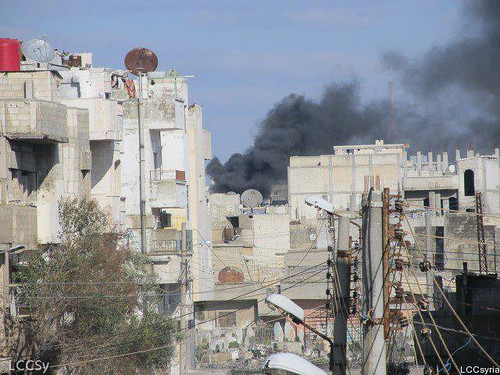
China called for an end to violence in Syria Sunday as the regime of Bashar al-Assad sparked international outrage by blocking aid from reaching the battered Baba Amr flashpoint in Homs city.
As more bloodshed was reported across Syria, Britain and Turkey joined the outcry, accusing the regime of committing a crime by barring Red Cross convoys from entering Baba Amr for the second day.
China, which twice joined Russia in blocking UN Security Council resolutions against Syria's lethal crackdown on dissent, urged all parties in Syria to "unconditionally" end the violence.
Xinhua news agency cited a foreign ministry statement attributed to an unnamed official calling for dialogue between the Syrian regime and those expressing "political aspirations."
But the official reportedly added: "We oppose anyone interfering in Syria's internal affairs under the pretext of 'humanitarian' issues.'"
As condemnation spiralled, the bodies of US reporter Marie Colvin and French photographer Remi Ochlik were flown back to Paris overnight from Damascus.
Relatives of Ochlik were there to meet his coffin as the regular Air France flight, via Amman, touched down at Charles de Gaulle airport in the French capital, an airport source said.
The two western journalists were killed in a rocket attack in the rebel Baba Amr neighbourhood of Homs on February 22.
Colvin's body was expected to be flown on to her native United States on Monday or Tuesday, according to a representative of her newspaper, The London Sunday Times.
French reporter Edith Bouvier of Le Figaro newspaper and British photographer Paul Conroy were wounded in the attack that killed their two colleagues.
Bouvier, 31, and photographer William Daniels, 34, who was not hurt in the rocket attack, have already been smuggled out of Homs by activists to Lebanon and on to Paris.
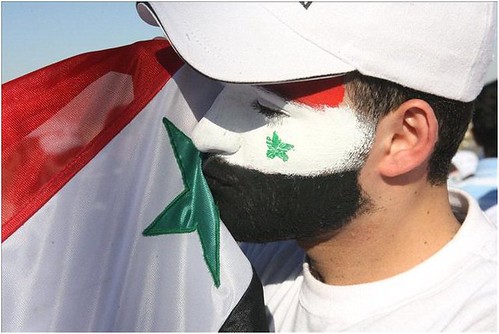
Syrian security forces on Sunday flooded a tense neighbourhood where a mourner was shot dead in the largest anti-regime rally seen in Damascus, activists said, blunting calls for a "day of defiance."
With protesters more emboldened in Damascus after 11 months of revolt which has largely escaped the city, President Bashar al-Assad's regime also came under regional pressure as Egypt joined other Arab League states in recalling its ambassador.
And the top US military officer warned on Sunday that intervention in Syria would be "very difficult" and said it would be "premature" to arm the opposition movement.
Although the security presence thwarted attempts to stage new protests in Mazzeh district, scene of a Saturday funeral that became a huge anti-regime rally, business there ground to a halt.
Mohammed Shami, a spokesman for activists in Damascus province, said most shops were shut in Mazzeh as well as in the Barzeh, Qaboon, Kfar Sousa and Jubar districts.
Student demonstrations had been expected in Mazzeh but security forces were stationed around schools, he said.
"Security forces are heavily deployed throughout Mazzeh," Shami said.
Another activist, Abu Huzaifa from the Mazzeh Committee, said police forced the family of Samer al-Khatib, 34, who died after being shot in the neck during the mass funeral on Saturday, to bury him in a small ceremony earlier than planned, in an apparent move to prevent protests.
Student protests however erupted after school in other areas of Damascus, including the districts of Al-Hajar Al-Aswad, Midan, Jubar and Barzeh, according to Shami.
In central Damascus shops opened as usual, witnesses said, while state television showed live interviews from Mazzeh with people who claimed life was normal there.
Deeb al-Dimashqi, a member of the Syrian Revolution Council based in the capital, told AFP earlier that "huge demonstrations" were expected, but added that security forces had imposed a tight clampdown.
In a message to Damascus residents on the "Syrian Revolution 2011" Facebook page, activists said: "The blood of the martyrs exhorts you to disobedience," after more than 6,000 deaths since anti-regime protests erupted in March, according to activist estimates.
Activists and official media reported at least 14 people killed on Sunday.
A "terrorist group" shot dead prosecutor Nidal Ghazal and judge Mohammed Ziyadeh and their driver in the northwestern province of Idlib, the official SANA news agency reported.
Four people, including a student, were killed and three wounded when gunmen fired on a bus in the central province of Hama, SANA said.
Security forces shot dead a woman when they stormed the town of Sukhna in Homs province as they hunted activists, the Britain-based Syrian Observatory for Human Rights said in a statement.
It also said that a man was shot dead at a checkpoint in the northern province of Aleppo.
A lawyer was shot dead as troops stormed the town of Al-Ashara in the province of Deir Ezzor, the Syrian Observatory said.
An army deserter was killed in Bab Sbaa in Homs, while three troopers were killed in a gunfight with deserters in Dael village in Daraa province, the southern cradle of dissent, the Observatory said.
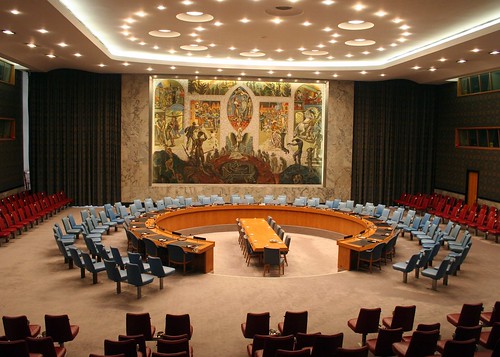
Outrage grew on Sunday after Russia and China blocked a UN Security Council resolution condemning Syria for its crackdown on protests, with the opposition saying it handed the regime a "licence to kill."
Saturday's rare double veto drew swift condemnation from world powers, with Washington saying it was "disgusted."
Russia blamed Western powers for the Security Council's failure to pass the resolution, saying they had failed to make an additional effort for consensus.
"The authors of the draft Syria resolution, unfortunately, did not want to undertake an extra effort and come to a consensus," Deputy Foreign Minister Gennady Gatilov wrote on Twitter.
The failed resolution followed widespread disgust at what the opposition Syrian National Council (SNC) labelled a "massacre" overnight Friday in the central flashpoint city of Homs and a spiralling death toll.
Activists and residents had reported more than 200 civilian deaths, including women and children, during a massive assault by regime forces there.
On the ground, activists on Sunday reported another 60 people killed in Syria, adding to the body count of one of the bloodiest weekends since the uprising against Assad's regime erupted almost 11 months ago.
Opposition groups say at least 6,000 people have now been killed in Syria since last March.
The surge of violence coupled with the second UN double veto in four months triggered a wave of international outrage at the failure to reach a common stand at the United Nations.
The SNC said in a hard-hitting statement that "Syrians and others around the world" had looked to the Security Council to issue a strongly worded resolution.
"The SNC holds both governments accountable for the escalation of killings and genocide, and considers this irresponsible step a licence for the Syrian regime to kill without being held accountable," it said of Russia and China.
US ambassador to the UN Susan Rice said Russia and China "remain steadfast in their willingness to sell out the Syrian people and shield a craven tyrant."
The veto controversy comes ahead of a Tuesday visit to Damascus by Russian Foreign Minister Sergei Lavrov and Russia's Foreign Intelligence Service (SVR) chief Mikhail Fradkov for talks with Assad.
"Russia strongly intends to achieve a rapid stabilisation of the situation in Syria through the rapid implementation of much-needed democratic reforms," the Russian foreign ministry said in a statement Sunday.

William Hague has called for a stepping up of the fight against Somali-based terrorism as he became the first British foreign secretary to visit the war-torn state for 20 years.
His arrival in the capital Mogadishu amid tight security marked the start of a major diplomatic push to bring stability to a country he described as "the world's most failed state".
Mr Hague said recent gains by the 10,000-strong African Union force in the country (Amisom) had driven back the radical Islamist group al Shabaab from the capital. But with much of the south of the country still controlled by the organisation, which has links to al Qaida, he said there must be no let-up in the pressure.
Britain is hosting a major conference on Somalia in London later this month, attended by representatives of 50 nations in international organisations. Mr Hague promised that counter-terrorism would be high on the agenda as well as tackling piracy and Somalia's deep humanitarian problems.
"One of the objectives of our conference in London is to strengthen counter-terrorism co-operation to make it easier for countries in this region to disrupt terrorist networks, to disrupt their financing and the movement of potential terrorists," he said.
In 2010, MI5 director-general Jonathan Evans warned it was "only a matter of time" before terrorists trained in Somali camps inspired acts of violence on the streets of the UK. However, ministers believe the success of the Amisom offensive last August in driving al Shabaab from Mogadishu has opened up a window of opportunity.

Pakistan on Wednesday hit out angrily at a leaked NATO report accusing its spies of secretly aiding the Afghan Taliban, saying that pre-dawn air strikes killed at least 20 local Taliban fighters.
Pakistan's alliance with the United States and NATO plummeted to an all-time low after US air strikes killed 24 Pakistani soldiers on November 26 and Islamabad has since shut its Afghan border to NATO supply convoys.
Relations with Afghanistan are also notoriously frosty over mutual blame for insurgencies plaguing both countries, but top-level talks in Kabul on Wednesday had been aimed at charting new cooperation.
But the leaked NATO document claims that Islamabad, via Pakistan's ISI intelligence agency, is "intimately involved" with the insurgency and that the Taliban assume victory is inevitable once Western troops leave in 2014.
The BBC said the report was based on material from 27,000 interrogations of more than 4,000 captured Taliban and Al-Qaeda operatives.
"Pakistan's manipulation of the Taliban senior leadership continues unabatedly," the report was quoted as saying.
Taliban captives said Islamabad was using a web of intermediaries and spies to provide strategic advice to the Taliban on fighting US and NATO troops.
Related article: Pakistan jet strike kills 20 Taliban
"This is frivolous, to put it mildly. We are committed to non-interference in Afghanistan and expect all other states to strictly adhere to this principle," Pakistani foreign ministry spokesman Abdul Basit told AFP.
A senior security official condemned the leak, as reported by the BBC, which also broadcast a documentary "Secret Pakistan" last year accusing parts of Pakistan's intelligence service of complicity with Taliban militants.
"The report is not available, leaks not worth commenting," he told AFP.

On January
Khoroshkovskiy started his career in business early and was always reaching great results in almost all the areas of his activities. At the age of 29, he became a member of the parliament and one of the leaders of the most influential party of those times – the People’s Democratic Party. At the age of 32, he became a Minister of Economy in the first government of Viktor Yanukovych. In 2005 – 2007, he was chairing one of the largest transnational corporations – “Evrazholding” with its headquarters in
Almost all the people who I have spoken to in Kyiv highly appreciate managerial talents of Khoroshkovskiy. “He is a liberal and a manager of the modern European style, a supporter of reforms and
Experts say that it will not be easy for Khoroshkovskiy to be in the government. The Prime Minister Mykola Azarov is a man of the old school of management. He is considered to be a “lame duck” in Kyiv, and they speak about his dismissal in the nearest future. This is the last year of Azarov being a Prime Minister: this year he turns 65, and according to Ukrainian legislature this is a maximum tenure of a politician in office. Khoroshkovskiy is mentioned among the possible contenders for the post of a Prime Minister after Azarov leaves. At his time, Khoroshkovskiy voluntarily left work in the government because of the conflict with Azarov. Now they will have to work together for some time, although the previous minister of finance, Fedir Yaroshenko, was Azarov’s protégé, and Azarov tried to postpone his dismissal.

A month after he became the lonely man of Europe, Prime Minister David Cameron's efforts to win friends and influence people met with mixed results at the latest summit in Brussels.
He won a new ally when the Czech Republic joined Britain on the outside of a fiscal treaty signed by the rest of the European Union -- but then found himself embroiled in a spat with an old ally, French President Nicolas Sarkozy.
Cameron is also on a political tightrope between the EU, Britain's biggest export market, and his own party, which wants him to take a tough stance against the bloc or even leave it altogether.
So, it was not the firebrand Cameron of December on show Monday but a more subdued figure keen to appease other leaders -- and receiving a kiss on the cheek from German Chancellor Angela Merkel for his pains.
He kept up his rhetoric about ensuring that Britain's interests are not hurt by the new treaty.
"We will be watching like a hawk," he said, reiterating calls for eurozone countries to recapitalise their banks, deal with Greece's debt drama and establish a financial "firewall".
Cameron also insisted that he had kept Britain out of a treaty that it did not need or want.
He received some vindication for his stance when the Czechs decided that they too could not endorse the fiscal pact.
But he had already backed down on an earlier threat made in December to veto the use of EU institutions by other countries that join the pact.
He had also softened his language from the previous week, when he launched a stinging attack on his EU partners, slammed the eurozone as uncompetitive and branded as "madness" a planned transaction tax.
Cameron had also picked a fight over the European Court of Human Rights last week, saying it needed urgent reform to stop it overriding the decisions of democratic member nations.
Tensions rose to the surface again when Cameron and Sarkozy took digs at each others' countries.
First Sarkozy said in a speech on Sunday that Britain had "no industry" left.
That prompted Cameron to say that the French president's "mad" plans for a financial transactions tax would drive French banks over to Britain.
"In the spirit of this healthy competition with France, if France goes for a financial transactions tax then the door will be open and we'll be able to welcome many more French banks, businesses and others to the UK," Cameron said.
But asked if he would be backing the French president's re-election this year -- as Merkel's party said she would -- Cameron tried to play it down lightheartedly.
"I am a big supporter and friend of Nicolas Sarkozy and I wish him well," he said.
"Every now and again he says something I don't agree with -- today when he said that Britain is short of industry, we actually have a larger industrial sector than France."

Germany is proposing that Greece should temporarily cede sovereignty over tax and spending decisions to a powerful eurozone budget commissioner before it can secure further bailouts, an official in Berlin has said.
The initiative is being discussed among the 17-nation currency bloc's finance ministers because Greece has repeatedly failed to fulfil its commitments under its current multi-billion pound lifeline, the official said.
The proposal foresees a commissioner holding a veto right against any budgetary measures and having broad surveillance ability to ensure that Greece will set its priorities on repaying its debt as scheduled, the official said.
Greece's international creditors - the so-called troika of the International Monetary Fund, the European Union and the European Central Bank - are currently negotiating another 130 billion euro rescue package for the heavily indebted country.
But German news magazine Der Spiegel cited an unnamed troika official as saying that Greece might need a total of 145 billion euros in its second bailout package amid the country's prolonged and sharp recession.
The German proposal is likely to spark controversy in Greece. A powerful budget commissioner would further diminish the political leeway of Greece's government, just as politicians there are gearing up for an election set to take place this spring.













